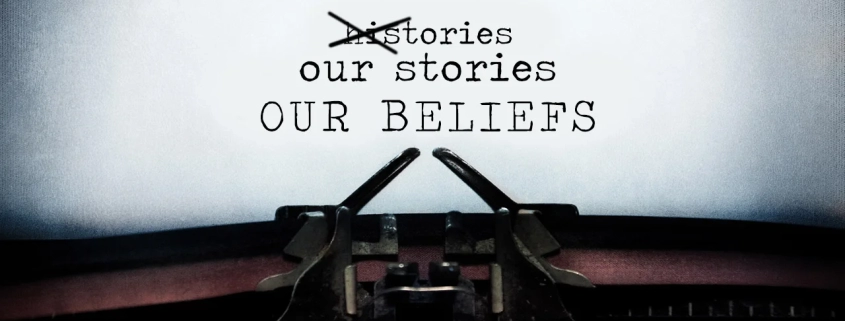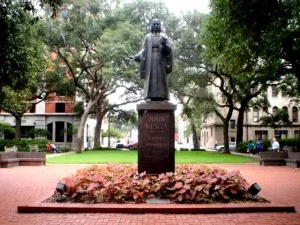Pastor James Clarke’s sermon for Sunday, October 9, 2016. This is the first sermon on Stewardship. You can listen to the sermon here.
I just can’t understand how in the world Issac Newton figured out gravity. I have this image as a child that he went up into a tower, dropped the apple and said…
Hmmm…. Gravity!
It’s not something we feel or see or experience. Unless we get out of gravity and we recognize that something’s there. But generally our “normal” is gravitational.
Consider all the other forces that we do not see.
What do you think would happen if a person from biblical times heard a radio? A cell phone would be over the top, I think.
I remember a movie that was set in French Canada in the 18th century in which this person first wrote down something on a piece of paper and handed it to the other person and they said what it said. And all the natives were amazed. It was a miracle. Can you imagine what they would have done with WiFi?
I have trouble understanding WiFi. I just don’t get it. It’s not natural. And I think Issac Newton would have been blown over too.
You know that Wifi is based on quantum physics which Newton clearly did not understand.
These forces that make up so much of our lives are really remarkable. Think of it just for a moment… how all that information is traveling in the air!
It’s spectacular. And we don’t have to really go back to biblical times or 18th Century French Canada to feel that, because, when I was young these things didn’t exist and if I had known that they were going to exist when I was a teenager, I would have been wiped out.
And then we simply accept that they are our new normal.
At the same time, we are oblivious to other forces that are all around us that are also invisible and not detectable by our senses. Forces that people in biblical times were very aware of. As aware of as gravity.
Spiritual power. Principalities and forces.
We are so Newtonian in how we see the world that our perception simply has not caught up. With quantum mechanics or relativity.
We see the world through the lens of science and Newtonian physics and reason and everything is material and substance and that’s when something is real, material and substance, when actually it is all energy, that is changing all the time.
A book is not simply a book, it’s “booking.” A rock is “rocking.” A tree is “treeing.” We are “we-ing” and the spirit is around us all the time. There are fields of force in our world that are not material and that we cannot learn about through our five senses.
Athletes know well about mojo. I can remember a time when I was playing basketball and I felt like I was connected to the rim. You know that feeling for a while that just every time you throw it up it’s going in.
Momentum is real. I’m not talking just about Newtonian momentum.
When people join the church, as we just did a little while ago, I have to ask them these traditional questions. I make sure and tell them there traditional questions because I’m a little worried that the language of “the spiritual forces of wickedness” is going to scare them to death.
But I believe it.
Not as personalized demons but as fields of force. Hatred is a field of force. The Klu Klux Klan. Racism is a field of force. They’re not just ideas, they are forces in people.
Addiction is a force.
I believe that owning guns influences people. It is true of any object, but it is particularly true of objects that have particular power. Guns exert force. Remember the gun is not just a gun, it is “gunning” all the time.
Simply by owning and touching and using something it can exert power over us and change us. Trump is a field of force. It is not about him as much as he would like to be about him.
It’s about the power and the feelings and the griefs and the aspirations of all those people who are following him. Not ideas. They don’t even talk much about ideas. It’s a field of force.
Love also is a field of force.
I remember the time in seminary when I was reading Romans. I took a class in Romans and the professor was telling us that the thesis for Romans is in the first chapter 16th and 17th verses and it says, “For I am not ashamed of the gospel; it is the power of God. For salvation to everyone who has faith…
Did you hear it? It’s not the idea, it’s the power of God. Real power.
In the book we are getting this material from is a book called Defying Gravity by Tom Berlin. He talks about financial gravity and when he’s doing this he’s talking about money as a force, not just as material stuff but as a reality that exerts power in the world.
Just like with guns, when you handle money, it’s going to influence you.
For Berlin, money exerts power in our life and it’s an invisible power. And it is there when you go shopping when we invest and we look at our checkbook and we go into debt and he says:
The problem with financial gravity occurs when you feel it with such intensity that it changes the way you live your life. You sense it at certain moments, such as when you examine your bank account, noting the balance is lower than you had hoped for, or when you see that your credit card bill is higher than you would like. You feel it when you open up the Internet browser and see ads posted for items that are magically in the styles and colors you like. When you walk down the street of the local town center, with its eclectic mix of retail stores, specialty shops, cinemas, and restaurants, you can almost reach out and touch the force I am describing. Enter a shopping mall, and it is palpable. There is something attempting to pull you inside each store as you pass.
I feel that force every time I go into the mall, and it gives me the “willies.”
Most of the time we think of money, we believe that we have the power because we can decide what to do with it. It’s all ours, and that’s the way it should be. But we rarely think about money having power or exerting power over us.
In I Timothy, he says that the love of money is the root of all kinds of evil. He’s talking about money as a force.
For the love of money that is allowing ourselves to moved by the power of money to the point where we see the price of everything but we don’t know the value of anything.
Maybe we should consider the credit card as a “spiritual force of wickedness.”
I think about that. We introduced the credit card in the 1980s and look what happened to us.
It became a force in our lives. That changed our lives.
Berlin also talks about two kingdoms. He calls it the kingdom of the self and the Kingdom of God.
He says the story in Matthew about a young man who could not sell all he owned was a good person. He was trying his best to live a good life. But, he felt financial gravity exert its pull in a way that suddenly was palpable. His emotional response in that moment is a testimony to the confusion and disorientation he felt.
The young man was torn between two worlds. Haven’t we all been torn between two worlds?
I read an editorial in the Seattle Times this week by David Brooks. He’s the conservative commentator on PBS each week. And he’s with The New York Times.
And he contrasts the difference between a taxpayer and a citizen. A taxpayer focuses on the individual, the goal is to pay as little tax as possible, obeying the law and looking out for oneself. A citizen, on the other hand, on the other hand considers more than him/herself. There is a sense of civic duty to paying taxes. So that the goal is to determine one’s fair share and pay that.
A healthy nation isn’t just an atomized mass of individual economic and legal units. A nation is a web of giving and getting. You give to your job, and your employer gives to you. You give to your government, and your government gives to you.
If you orient everything around individual self-interest, you end up ripping the web of giving and receiving. Neighbors can’t trust neighbors. Individuals can’t trust their institutions, and they certainly can’t trust their government. Everything that is not explicitly prohibited is permissible. Everybody winds up suspicious, defensive and competitive.
This is the Kingdom of Self.
And just like the rich man in the Gospel we also live between these two worlds: financial gravity and the gravity of God.
Tom Berlin talks about wealth as if it is the planet Jupiter. The largest planet in our solar system. Exerting massive gravity on all of us.
Having wealth, simply having it, changes us. It has a great deal of power over us. And frankly, confessionally, I have trouble trusting people who have extreme wealth, because I know the power it exerts.
In the same way that wealth is like Jupiter, then I would say that generosity is like Saturn. It too exerts influences on us.
That giving is not just a decision we make in our brains. It’s not just for tax purposes.
It is a spiritual discipline.
Spiritual because it changes our hearts, in the same way the accumulation of wealth shapes us, so does giving. Giving defies gravity and transforms our hearts.
There are all sorts of forces all around us. It’s not that everything is physical. Reality is different than we thought it is. It’s more like energy. And everything has energy.
Have you ever had resentment take over your life? Resentment can be a force.
Patriotism is a force for good and not so good at different times. Did you see how people responded to Kapernick?
Xenophobia and homophobia are forces in the world that defy reason.
Did anyone see the story about the mother in Tennessee who pulled her child from the school because her child was learning about Islam?
Macho locker room talk is a force. And I confess, I have participated in that force… when I was 13, and even then I felt guilty!
School loyalty is a force, most of the time it’s a good one! Beaver Nation is a force. It’s one of the weaker forces!
Money is a force too. Financial gravity. There are principalities and powers in the world, and spiritual forces of wickedness. Can we not feel it?
There are all sorts of forces in the world and the question that we have to be asking is not what do you believe, but which force are you going to give your life to? What forces are you going to allow to move you?
Amen.











